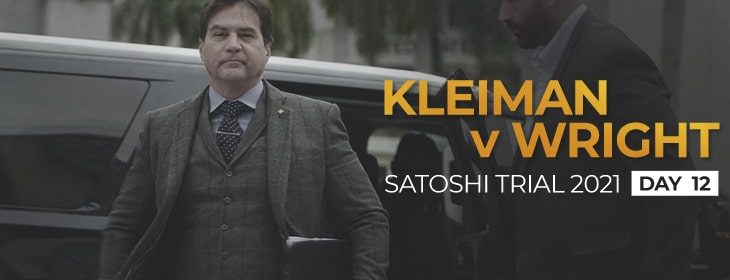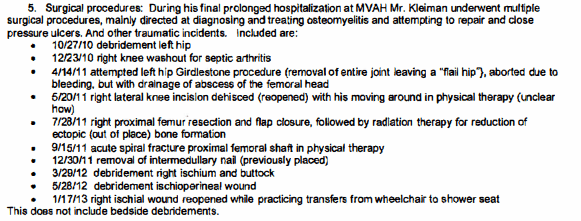Dave Kleiman likely too sick to be Satoshi Nakamoto, medical expert tells Kleiman vs Wright jury

It has been a somber week in court as the jury in Kleiman v Wright heard medical testimony of Dr. D Stewart MacIntyre Jr. on the health of the late Dave Kleiman in the years leading up to his death.
The obvious question being put to the Satoshi trial jury is whether or not Dave Kleiman was in good enough health to contribute to the multi-billion dollar partnership which the plaintiffs say involved creating and mining Bitcoin, and developing sophisticated intellectual property.
Per Dr. MacIntyre’s pre-trial expert report:
“Mr. Kleiman had a long and complex hospitalization, with many circumstances which would be expected to alter his ability to perform complex tasks, and no evidence of support by family or friends.”
Other than Dr. Ami Klin, who is set to testify to Dr. Wright’s Autism Spectrum Disorder diagnosis, Dr. MacIntyre is the only medical expert scheduled to offer testimony in the case. He’s an infectious disease specialist in private practice but with privileges at Miami’s Mercy Hospital.
Dr. MacIntyre examined 10,000 pages of records in compiling his expert opinion on Dave Kleiman’s health spanning from 1995 to 2013. From this, during his time on the stand, he was able to draw a precise image of Dave Kleiman.
It was the picture of a man in physical, mental and psychological turmoil for years before his death.
Kleiman suffered a motorcycle accident in 1995 which left him paralyzed from the waist down. His paralysis led to a variety of complications which persisted for the rest of his life. These included pressure sores from being immobile for extended periods which would regularly get infected and required constant attention. The sores were such that they also led to infections in other parts of his body, including his bladder and bones.
The court heard how for years before his death in 2013, Dave Kleiman was “almost never” able to sleep at home. His last hospitalization stretched for two years, five months and two days, only leaving on a temporary pass on March 21.
Dr. MacIntyre said that at the time he left the hospital, he would have been expected to suffer from uncontrolled infection without the medical attention he was receiving while under care.
He was eventually found dead on April 27, having passed some days earlier.
Though Dr. MacIntyre, being an infectious disease expert, was not offering his opinion on Dave Kleiman’s mental state directly, he was also able to testify about aspects of his medical record which nevertheless spoke to the subject.
Most obviously, Dave’s records show that he suffered from depression.
But the records also show that the of medications that Dave Kleiman was taking, there were a number which MacIntyre said could have affected his mental state to the degree that it would have gotten in the way of his ability to do work, even on his computer. These included valium and specialized antibiotics.
Notably, from September 2010 to April 2011, while Satoshi Nakamoto was still active, Kleiman had been prescribed Percocet and fentanyl, both highly potent painkillers.
“I think it would be—I have to use the well-known phrase more likely than not they did have an effect of dulling his ability to do complex work during the time they were being given,” said MacIntyre in his deposition.
So, Dave Kleiman had a tragically difficult life after his motorcycle accident which only seems to have worsened as he got closer to death, he was depressed, and he was on medication likely to interfere with his mental acuity.
But is it still possible that among all of the infections, surgeries, lengthy hospital stays and mental anguish, Dave Kleiman was still able to work on Bitcoin or, as the plaintiffs also contend, mine it in the years following its creation?
Dave Kleiman had his computer in the hospital, but if he was working, none of his carers ever took note of what he was working on. Amongst the 10,000 pages of records, Dr. MacIntyre told Andrew Brenner on the plaintiff’s cross examination that he found as little as 25 references from hospital staff notes which reference Dave using his computer.
Additionally, the list of procedures he had during his last stay in hospital is lengthy and his general wellness also didn’t seem to improve throughout his stay, which culminated in him discharging himself against medical advice.
When asked about Dave’s ability to work in hospital, Dr. MacIntyre’s response was unambiguous:
Q: In reviewing Dave Kleiman’s records, was there evidence that he couldn’t work?
A: Yes, the intravenous lines, depression and just being in the hospital are impediments to work.
What’s more, other than the persistent back and forth between him and Dr. Wright, the records show that Dave Kleiman received very little support from family and friends while he was ill.
Even then, his time with his own devices appears to have been limited. Emails between Dave Kleiman and one of his friends and former colleagues subsequently shown at trial involve Dave complaining about the mere five minutes he had access to his phone in which to talk.
Kimon Andreou, who also testified this week, said that he visited Dave as much as every working day over a two-year period. He testified this week that not once did Dave ever mention Bitcoin.
Carter Conrad, a former friend and business partner of Dave’s, testified that when he did visit Dave Kleiman in hospital, he similarly never mentioned Bitcoin.
Therefore, it seems unlikely that anyone was helping Dave Kleiman work past his significant physical and mental limitations during his hospitalization—certainly not to the point where he could have participated in a multi-billion-dollar business partnership.
Ira Kleiman never visited his brother in the hospital despite living minutes away. Such a visit would have been a good opportunity to learn something about how Dave Kleiman was passing the time during his illness—but it never happened.
The third week of Kleiman v Wright wraps up Friday. There is potential that the defense will call Dr. Craig Wright back to the stand during their case, but given Wright’s lengthy testimony in the plaintiff’s case-in-chief, it doesn’t seem out of the question that his lawyers would choose to focus on avenues of defense a little less explored.
CoinGeek features Kurt Wuckert Jr. in recap coverage which will be livestreamed daily at 6:30 p.m. EST on our YouTube Channel.
Watch our Day 12 Special Report from the Kleiman v Wright trial here:
Check out all of the CoinGeek special reports on the Kleiman v Wright YouTube playlist.
Source: Read Full Article

